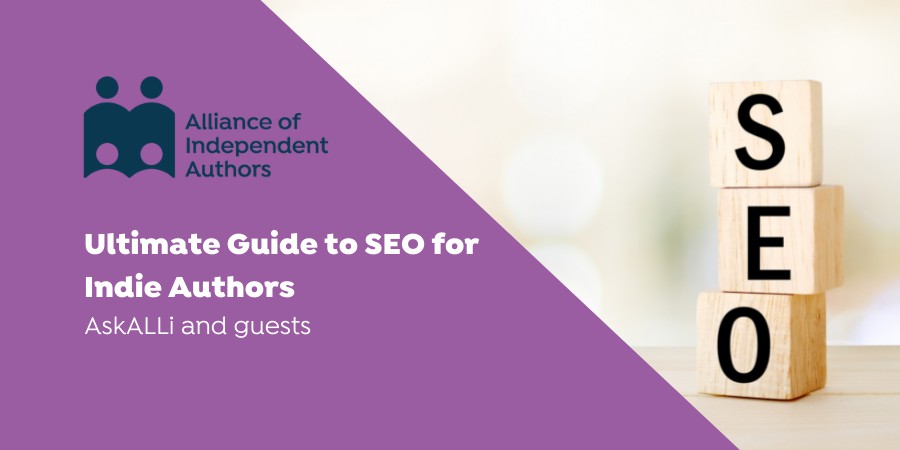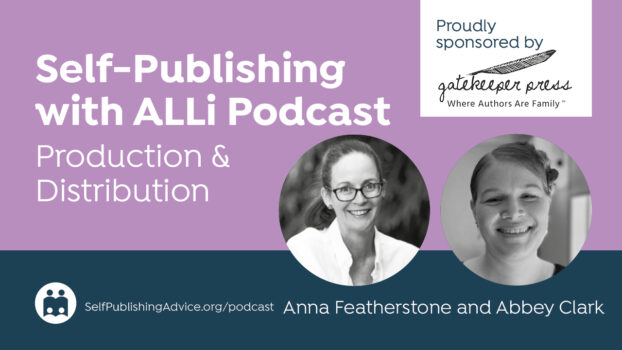SEO is one of those acronyms that strikes fear into the heart of non-techy authors. We may know it stands for Search Engine Optimization and that it's key to our websites and books being found by readers but we may not have the first clue how to go about it, or even why it's important. And while there is a lot of advice for making straight how-to, non-fiction findable, literary writing poses particular challenges. This is the Alliance of Independent Authors no-coding required Ultimate Guide to SEO and Findability for Indie Authors. Our thanks to Penny Sansevieri of Author Marketing Experts, Michele DeFilippo of 1106 Designs contributions to this post.
The Value of Words and SEO for Indie Authors
If you’re serious about selling books online, you need to understand SEO but indie authors often avoid the topic, dubbing it too complex, time-consuming, or techy. Actually, the technical aspects of SEO are simple and the tech is all done for you, if you choose the right tools. Once you've got a clear understanding of the value of the piece of writing you're creating, SEO is easy.
That's really where the SEO challenge really lies for authors: understanding a book's value to readers, then being able to sum that value up into keywords and key phrases that people actually use.
Digital marketing specialists and marketeers can spend hours arguing over search engine optimization and SEO strategy but this ALLi guide will only tell you what you need to know. The advice here will be relevant for literary and narrative nonfiction–like essays and memoir –as well as novelists, short story writers and poets.
It’s not as puzzling (or boring) as it seems and you can greatly improve your SEO without getting bogged down. It's very possible to move your website, or books pages, from page three or lower in a search by simply changing your page titles in line with the words people are actually using to search out books like yours.
Get it right and you get more reader eyeballs on your words and on your books. Which is what we all want, right?
What is SEO?
SEO stands for Search Engine Optimization, which essentially means your website and book sales pages are behaving in ways that search recommendation engines like them to behave. Michele DeFilippo, CEO of 1066 Designs, explains.

Michele DeFilippo, CEO 1106 Designs
Being discovered by readers on the Internet is a big part of selling books. Author websites, blogs and an Amazon presence are critical. With over 1.7 billion websites and approximately 50 million book listings on Amazon, getting found can be very difficult without attention to SEO.
Search engines include Google, Bing and others. Amazon is also a search engine, where people can search for items in product categories, including books. When people search for something on Google or Amazon, they tend to look only at listings on the first few pages. SEO is focused on getting your listing on those first few pages.
Note that results will take time. Don’t expect to leap to page one of Google overnight. Page one is elusive, but with effort and time you can rank highly for certain keywords.
Search engine optimization has changed a lot over the years – mostly due to unethical practices of “black hat SEO,” which essentially means people are tricking the system (or trying to) to gain ranking. SEO, on your website, means being mindful of website headers, keywords, tags and ALT tags.
Getting a good ranking on a website calls for blogging or podcasting or some regular way of updating content and keeping keywords and keyphrases live on your site.
Technical SEO refers to any technical action taken in order to improve your search ranking results. It targets the crawling and indexing done by search bots to find and index your web pages on their system–a specialist skill that brings up lots of scary tech terms like canonical tags, robot.txt, sitemaps,structured data, SSL certificates and many, many more. The good news is that if you’re using a DIY website builder like WordPress, Wix or Squarespace, they take care of all of that for you. Doing SEO does not mean you have to understand any of those terms.
What are the Benefits of SEO for Authors
In short, good SEO brings more traffic to your website and book sales pages. Here's how.
-
- Findability. Good SEO means that when people go looking for the topic your book covers, your work is served up to them by search engines like Google and Amazon. The better your SEO in the various places you appear online–Amazon and other online stores and other people's podcast feeds and media as well as your own, the more findable you become.
- Visability. Authors and poets who have optimized their websites for search engines will be much more visible than those who haven’t. This will result in more book sales, page views, and media mentions.
- Author platform. When your or your book start appearing on the first page of search results for popular search terms, you get what the marketing people call brand awareness or brand recognition. People start to recognise your name and/or your book title(s).
- More sales – Combining good SEO with quality content on your website makes sales almost inevitable. These are people who are on your website or sales page because they searched it out. If you've done your job properly, you'll soon have a happy customer.
- User-friendliness – Search engines reward sites that are fast, smooth, and easy to navigate. So optimizing for search engines improves the reader experience, which warms up their relationship to you and your books.
Author SEO: What NOT to do
Your job is to categorise your book and isolate good keywords and key phrases to describe your work to those who are most likely to be interested. Your page name (Title Tag) should match what’s on the page or Google will sink your site in search engine results and your reader will feel confused, or worse, cheated.
Don’t use the Title Tag bestselling author, for example, except on a page that highlights when and how you achieved that distinction.
Many writers resist categorizing their website pages, blog posts and books, though, and so haven't done the work to find their niche. They avoid SEO because they actually don't like being categorized, or narrowing down into their niche. They'd rather keep things vague.
Vague and SEO don't go together!
Contrary to mythology in the author community, though, SEO works for everyone. Yes, even for novelists. Even for poets. Doing SEO makes us get to the heart of the value our books and our website pages are offering (yes, even poets have to think about their value to their readers in online bookselling).
Your SEO definitely needs more strategic thinking if you're a novelist or poet than if you write practical nonfiction, especially if you pride yourself on doing literary work that defies categorization.
Another reason so many writers fail at SEO is liking to write clever. Keep your wit and fine phrasing for your books. When it comes to getting traffic or selling books, be as clear and coherent as possible, and use the most highly searched terms.
Don’t shy away from longer key phrases if they get searches. Be guided by what your readers are actually searching for, not by your way of expressing it, or your clever idea.
On Page SEO for Authors
There are two types of SEO that authors need to think about – on-page and off-page. On-page SEO is what is happening on your website or sales pages. Off-page SEO refers to getting backlinks from other websites — blog posts, podcasts, author interviews, book reviews.
You can use keyword tools but the easiest and best way is to check Google and Amazon’s suggestions and related searches when you start typing your keywords.
For on page SEO, put yourself in your reader's shoes, ask yourself these brainstorming questions (some of them approach the question from opposing angles)
- How would I search for this book?
- Are there any questions a user might ask that my book answers?
- What synonyms or other phrases might I use?
- In which categories/disciplines would my reader expect to find this title?
- If a reader keys in my chosen key phrase, what are they expecting to find? What else?
- When I look at other books that come up for this keyphrase, does my book fit in?
- Which keyphrase connected to my book is most popular?
Create a total of 5-15 relevant keywords that reflect the content of your book and the way readers search for it. Define a main key phrase and if you can, integrate it meaningfully into your book title, your meta-description and your information pages about the book. Avoid excessive use of the keyword, though. (Unpleasant for readers and “punished” by the search bots.)
Define additional keywords from synonyms, variations and abbreviations.
Keyword Phrases and Keyword Strings
Where you and your readers meet is in keywords and keyphrases. According to Google, the more keywords a consumer types into Google, the closer they are to buying.
Penny Sansevieri explains:
Penny Sansevieri
When you head on over to Google and type in the term car, you probably won’t see any ads pop up for new or used cars. Google knows you may be looking for images or other car-related factoids. But if you pop over to Google and type in 2021 Subaru Forester, you’ll start to see ads for this particular car everywhere. Why? Because research shows that the more keywords a consumer uses, the closer they are to a buy.
I’m always a fan of using longer strings (even if it’s just two words) rather than singular keywords. Also, singular keywords are not a focused way to optimize your website.
Also, keep in mind that ranking for a singular keyword is a very, very hard climb up the Google search rank. Your time is better spent elsewhere.
You wouldn't want to feature for anything related to , for example, “depression”–as the person doing the search might be looking for a doctor, or a medicine. What you'd really like to feature for is “overcoming depression quotes and sayings”, which is what your book is actually about.
So get details that describe the value of your book in terms that people search for. To gain ranking for a specific keyword string, you need to feature that keyword on your website. And the more you feature it, the more you'll rank.
Make it a practice to write page titles and descriptions for each page and create blog posts that contain the unique keyword phrases you researched previously. Doing so makes it easier for Google to list your page or blog post properly.
If you have a WordPress website, install the plug-in Yoast SEO. Yoast SEO makes it very easy to enter the page title and meta description as you create a page or blog post and suggests how to use the keywords to optimize SEO for that page.
Note that:
- You must use a unique keyword phrase on each page of your website, including blog posts.
- Your keyword phrase must be included in both the page title and meta description to optimize SEO.
- You should repeat the keyword phrase a few times throughout the text of the page–but in a natural way.
SEO in Book Advertising Copy and Book Descriptions
Your books pages should be more than summaries and should keep SEO in mind. Pay attention to the natural use of the appropriate keywords and phrases.
Studies have shown that users have different reading habits in print and on a screen. Instead of reading the content of websites word for word, they scan the text for the relevant information only. This means:
- Use lists and enumerations in the appropriate places
- Write a description with a length of 200 to 300 words and split the text into several paragraphs.
- Include keyword phrases within the text in the form of questions and answers.
Set up keywords on Amazon and IngramSpark
On Amazon, the keywords and phrases you choose can improve your “findability” amongst the millions of books on Amazon.
Keywords are part of the metadata required for your book by Amazon and IngramSpark. Use your keywords in your book description and author bio on Amazon to improve search results.
By doing the same for IngramSpark, I can easily find your book on other websites of other booksellers.
Linking Out
Internal links are a good way to get readers to spend more time on your site by encouraging them to navigate through your website, one click at a time. Web visitors spending a long time on your website will also boost your SEO.
Michele of 1106 Design again: On every page of your blog or website, include links to websites external to yours. A post that contains links tells Google that it’s an important or high-value article and should rank higher in the search engine. Even links to pages on your own website can help (a little)! External links go from your website to a resource on another website, pointing your readers toward valuable resources. Only link to relevant information from a reputable source to get the most out of external links.
Off Page SEO for Authors
The things that matter to search engines often happen away from our own websites and mostly we don't control this–but there are ways to get more links back to your website. That is the aim. If you’ve got a lot of links pointing to your pages, search engines will assume that you’ve got great content. It's impossible for crawlers to establish the value of a web page if there are no links pointing to it. Links are online word-of-mouth and you are who Google says you are.
Off-page SEO tries to tell search engines what others think about your site. It has two main branches:
- social-proof: Social media drives traffic to your website. For example, if you post your most recent blog on Twitter, people may click on the post and follow it to your website. And Twitter and LinkedIn profiles show up in Google searches. When someone searches your name, these profiles will show up in Google. Likes, shares, & engagement on social media boost SEO and also have other benefits with readers, rights buyers, and others who are interested in your books.
- back-links: Inbound links from other websites linking to your website.
Social media play a lesser role in SEO. Backlinks and optimized on-page content are the most important ranking factors to focus on.
If you are going to instigate an off-page SEO strategy, concentrate on getting inbound links.
Inbound links
Always give your own website, not your Amazon book page or Facebook page, when asked for a link. You might get a sale or two from a link to Amazon, but attracting readers to your own website is worth a considerable amount more. Find out more on selling direct in our ultimate guide here.
Broadly though, here are some reasons why directing readers to your website is the best long-term strategy:
- You control your reader's information. Meaning you're able to contact them again
- You're more likely to attract newsletter signups
- You earn significantly more per sale from your website than if you get that sale on Amazon
- You build a readership that is truly independent. Many of us while being Indies are dependent on stores like Amazon or Apple Books. But if you're producing sales predominantly from your site, you truly are in control and therefore independent in the truest sense.
In summary, this is the concept of “bank before rank” in other words, prioritizing creating income rather than aiming for best seller tags and ranks.
Sometimes you'll link directly to a book sales page but sometimes, especially if you're writing for a “cold” audience, you'll do better if you link to a reader-magnet sign-up page on your website (you have one, right?)
Off-Page SEO is not just about inbound links. It refers to all the activities you and others do away from your own website wihch raise search ranking. Many activities that are important for off-page optimization are beyond the scope of this post but Neil Patel has a great post here.
SEO for Authors: Blogging and Podcasting
Blogging is a very solid way to build traffic to your website and help you gain visibility. Google used to reward frequency of blogging but now considers quality and length to be more important. Let’s look at some ways to do this smartly, and with the least amount of effort.
- You give yourself an advantage by blogging or podcasting. Google rewards active websites and ranks websites lower when their content never changes, as so many author websites don't.
- Google now rewards substance over frequency. 800-1,000 words, once or twice a month is enough to feature for the keywords, provided your content is valuable.
- You must be relevant, up-to-date and interesting. High traffic posts are rewarded.
- Remember that the point of your blog must make people want to buy your books so all the on-page SEO tips above apply to your blog. Penny Sansevieri offers some examples:
- If you write poetry about self-sabotage, for example, you might create blog posts that tie into a particular time of year. For example, sabotaging your diet as we near Halloween – when many diets go out the window.
- If you write fiction, consider expanding on themes from your book. We worked with a mystery author who wrote a series featuring a detective protagonist and, on his blog, this author solved a mini-mystery once a month. This kept his readers engaged with the lead character, too!
- For romance authors, you could feature snippets from the book – or talk about some of the places your characters visit. For example in one instance, an author we worked with blogged recipes from the various cafes and restaurants featured in her book. She sprinkled in other stuff, too. Character behind-the-scenes, deleted stuff that never made it into the final book, etc.
Your first goal will be to find keywords and develop blog posts around them – and/or use them in your blog. So, for example, if you’re a fiction author, your blog post doesn’t have to be focused on Christmas romance per se, but it should have the keywords in it if they appeal to your audience.
To keep it simple, I suggest finding a primary keyword string and a secondary string you can use. Once you have these, it’s good to use your keywords in the title post and for sure in the first fifty words of the post. Generally, I try to shoot for incorporating the primary keyword string 4-5 times per blog post. This isn’t always easy – but it’s really helpful to gain more traction and visibility for your individual pieces.
Every page on your website is an opportunity to get found on the internet. The more pages your website contains, the more chances to get found!
That’s why your author website should include a blog. New blog posts give people reasons to visit your website; increased visits help your website rank higher. You will have more pages to show up in Google searches. Plus, you’ll show off your writing, promote your book, and perhaps collect content and ideas for your next book.
To maximize the potential of your blog ranking for popular keyword phrases, stay on top of relevant trends and current events and comment on them as soon as you can.
The optimum length for a blog post to get noticed by Google is 900-1300.
SEO For Authors: Tracking and Improving
- Search in Google or Amazon using some of your chosen keyword phrases. In your browser, open a private or incognito window, which does not track your previous searches or location. Where does your website or book rank for those keywords? Top Three? Excellent. Page 1? Great. Page 2 or lower. Time to tweak.
- On your author website, use Google Analytics to track visitors, page views and amount of time spent on your website. Click here for instructions. Google Analytics takes a little getting used to but it's super valuable information about your readers: where they come from, which pages they are visiting, where there are opportunities for improvement.
It takes time to see results and SEO is an ongoing practice. Set aside 90mins a week to make the tweaks to your website and books sales pages that make a difference to the search engines. Pay attention to comparable authors and titles on Amazon, Apple, Google, IngramSpark and Kobo.
If you're consistent, you will see the rewards.
SEO FOR AUTHORS: FURTHER RESOURCES
- SEO supremo Neil Patel
- Ubersuggest is an excellent tool by Neil Patel.
- In ALLi, we use the Yoast plugin. This is a simple to use and excellent plug in that uses a traffic light (red, amber, green) code to tell you whether or not your SEO is correct. It also has helpful tips and suggestions in the key areas for ways you can improve your SEO, i.e., you've not used the key phrase enough or perhaps you've used it too much, or you need to put the phrase in your opening paragraph etc.
- Moz.com is a website that enables you to gain information about your site ranking, the most frequent links to and from your site and keywords. You can try one or two website URLs for free before you have to sign up.
- If you're a data person then SEMRush might be a good option, complete with a comprehensive dashboard and the ability to analyze competitors, one downside is that it does use some complex wording and terminology.






Over the years I have written a quad dilogy of science fiction. I am in the process of having a new website designed. I am told, and I believe to have any chance of success, I need a SEO. I am certainly not tech savvy and will require help in setting up a SEO. I suspect it will take another week or so before the new website is complete.
Any suggestions you may have will be a great deal of help to me.
Thank you in advance,
Dennis Flannery
thank you for the guide and tips … it make sense
Some good solid SEO tips here. Just using Keywords, the right Keywords have a positive impact on getting searched.
I’ve found with my creative work, writing and self-publishing is easy. Marketing myself is the time-consuming part. Having a simple list of tasks, and ways of doing it, is beginning to help me.
Great article.
I am so sorry, but I violently disagree with you! NOBODY sells novels from their own website! Not Stephen King, not Nora Roberts, not mid-list authors like Mark Dawson (who is so good at book marketing that he makes as much money selling his expertise as he does from his novels). NOBODY.
How would I get it printed? How can I sell it if I do not have a POD printer available? Would I be stuck with the expense and uncertainty of publishing hundreds, figuring out how to warehouse them, then spending time manually distributing them? That’s an AWFUL lot of risk and labor! HOW would I even set it up? Do I have to set up a Shopify store? If not Shopify, then who? Lulu Press (the only POD provider that springs to mind) is known for poor-quality books. Do I really need to compromise THAT much?
It is against Amazon’s terms of service to sell independent of their platform if you enroll your book in Kindle Unlimited – and Amazon can shut me down and ruin my career irrevocably and instantly; I do not want to risk it.
You glance past independent distribution as if it is a mere trifle. Publishing independent of a large distributor (Amazon, IngramSpark, Apple Books, etc.) is no mere trifle. Independent publishing and distribution of novels is a VERY complex and DANGEROUS undertaking. It is as risky as opening a restaurant (80% of new restaurants fail within 5 years of opening). It also completely eliminates any possibility of retail or library sales and significantly throttles down international sales.
You SAY that I would be truly independent, but I can see no way of achieving that blessed state. I think your advice is horribly, dangerously wrong.
It is not against KDP Select ToS to sell your print books wide. KDP Select only locks your ebook into digital exclusivity.
You can sell from your site by ordering POD books to your home. You don’t even have to stock inventory, just note they’re being backordered and order them as your customers purchase (just be clear about shipping times). There are lots of options besides Shopify, WooCommerce being a major one.
Well-researched, informative article. Thank you.